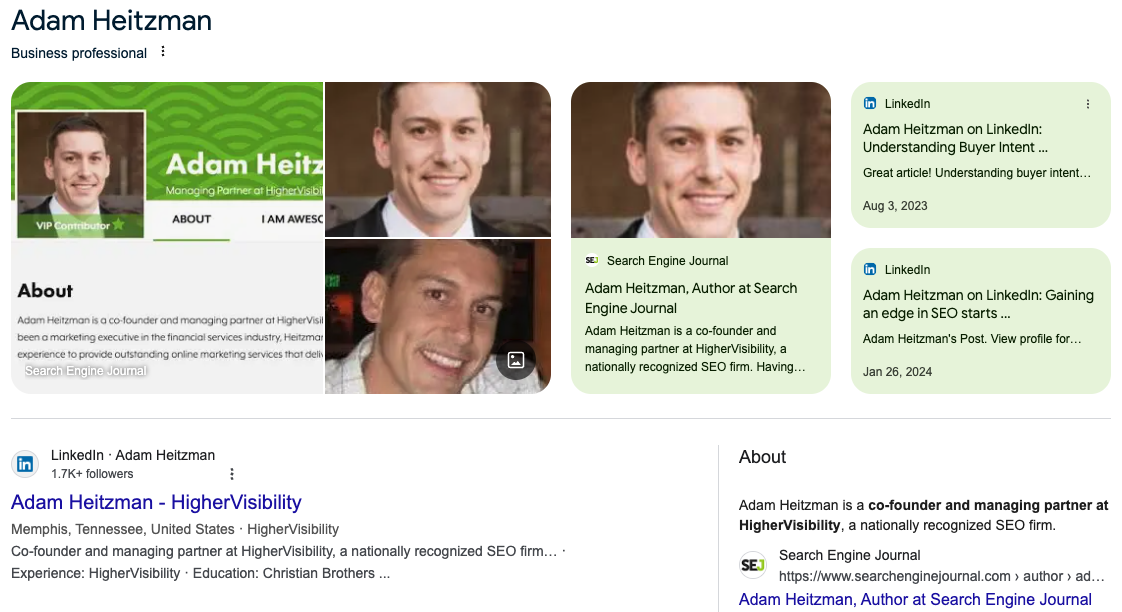Personal branding is the public-facing identity you create for yourself. It’s an authentic but carefully managed representation of you as a professional.
Proving your experience and expertise in your field is a critical component of modern digital marketing.
Users and search engines prioritize first-hand knowledge, so personal branding can be a competitive advantage for businesses and individuals. It’s also helpful for career development and cultivating new opportunities.
The SEO industry is rife with misunderstandings and misinformation. As an SEO professional, personal branding is key to cutting through the noise and standing out.
Want to be seen as a trustworthy expert in your field?
If so, you’ll need to master the art of personal branding.
It’s an essential strategy for professionals in any industry who want to stand out in a crowded marketplace.
In this post, we’ll explore the ins and outs of personal branding and walk you through the fundamentals of building your own personal brand.
What Is Personal Branding?
Personal branding is the process of constructing a distinctive online brand identity for yourself, typically in a professional context.
Think of it as an ongoing effort to influence how others perceive you, including what values, interests, skills, and contributions they should associate with you.
The process involves actively curating your digital presence across different platforms to present a coherent and appealing image of who you are and what you stand for.
The ultimate goal of personal branding is to leave online audiences with a strong and memorable impression of who you are so you can establish yourself as a thought leader, expert, or influencer in your field.
 Screenshot from search for [Adam Heitzman], Google, April 2024
Screenshot from search for [Adam Heitzman], Google, April 2024Why Is Personal Branding Important?
In an era where attention spans are getting shorter by the minute, the need to make an impression is more important than ever – and the best way to do this is by creating a solid and memorable brand identity.
Unfortunately, many business owners do not realize the importance of personal branding because they think it’s a lot of extra work.
However, the truth is that if you want to create a successful business, you must create a successful brand.
People who know you and your business will trust you more and, ultimately, buy more products and services from you.
The 4 Benefits Of A Personal Brand
Establishing a strong personal brand offers several key benefits that can significantly enhance your professional and personal growth.
After all, your personal brand determines what others think and say about you when you’re not in the room. It’s basically your public reputation as a professional – and it can make or break your career.
Here are the four main benefits of successful personal branding:
1. Helps You Stand Out From The Crowd
Creating a personal brand allows you to showcase what makes you unique in your field – be it your specific skills, experiences, accomplishments, or personal values.
This differentiation makes you more memorable and attractive to potential employers, clients, or partners, enhancing your competitive edge in the job market and improving your ability to command a higher salary.
A well-developed personal brand clearly communicates your unique value proposition, making it easier for decision-makers to see why you’re the best fit for new projects and opportunities.
2. Increases Your Visibility And Recognition
Personal branding elevates your profile and positions you as a go-to expert in your field or industry.
This visibility comes with increased recognition that can extend well beyond your immediate network and pool of online followers.
For example, by consistently sharing insights and contributing valuable content within your niche, you can attract the attention of industry influencers, media outlets, and potential employers, customers, or clients.
In other words, by increasing your exposure, your personal brand serves as a springboard for new career opportunities.
3. Bolsters Your Credibility
One of the main psychology-based reasons to invest in your personal brand is that it helps you earn the trust of your audience.
By consistently sharing insightful content, engaging in meaningful conversations, and demonstrating your unique skills, you reinforce your reputation as a knowledgeable and reliable professional.
The more credibility you build, the more you’ll attract new opportunities and encourage others to seek your opinion, advice, and collaboration.
4. Gives You More Control Over Your Online Presence
When a client, follower, or industry peer mentions your name to someone new, chances are they’ll head to Google to see what the fuss is about.
 Screenshot by author, April 2024
Screenshot by author, April 2024- For this reason, having a well-curated online presence can have a huge impact on your professional opportunities.
- Personal branding lets you take charge of your digital footprint, ensuring that what people find when they search for you online is accurate, positive, and aligned with your professional goals.
Examples Of Personal Branding That Work
Now that you understand the advantages of developing a personal brand, let’s look at a couple of real-life examples of professionals who have nailed their branding and reaped the rewards from it.
David Perell
Known as “The Writing Guy,” David Perell has built a strong personal brand around his expertise in online writing.
He has harnessed the power of the internet to inspire and coach thousands of people to improve their writing, build an online audience, and leverage that audience to propel their careers.
Thanks to his popular course “Write of Passage,” his prolific social media output, and his frequent podcast appearances, David has successfully positioned himself as one of the world’s leading proponents of the power of online writing.
 Image from perell.com, April 2024
Image from perell.com, April 2024Marie Forleo
Marie Forleo is an entrepreneur, author, and the creator of MarieTV, an award-winning web show that helps viewers realize their potential in business and in their personal lives.
Her personal brand revolves around the philosophy that anyone can lead a dream life if they’re willing to put in the effort. The title of her book, “Everything Is Figureoutable,” has become a mantra for personal growth and resilience, emphasizing that all problems can be solved with enough determination.
Marie has successfully used her platform to inspire millions with her practical advice, engaging personality, and unwavering belief in the potential of her viewers.
 Image from YouTube, April 2024
Image from YouTube, April 20246 Steps To Build Your Own Personal Brand
So, what should you do to develop a personal brand?
Here are the six key steps to successful personal branding.
1. Define Your Brand Identity
The first step is all about self-reflection and clarity.
Your goal here is to figure out what you stand for and how you want to be perceived.
Identify what makes you unique – this could be a combination of your distinctive talents, perspectives, values, and passions. Consider your career achievements, distinguishing personality traits, and any notable challenges you’ve overcome that shape who you are today.
Remember to stay true to your authentic self, not just what you think others want to see. Being genuine will help you connect more deeply with your audience, shaping a brand identity that is both relatable and trustworthy.
Plus, being yourself is much less work than pretending to be someone else!
2. Determine Your Target Audience
Next, you need to clarify who your personal brand is speaking to.
Your target audience could be potential employers, clients in a specific industry, a professional community, or peers who share similar interests to you.
You should understand what they care about and their challenges so you can tailor your content and messaging to align with their specific needs.
3. Develop A Personal Brand Statement
A personal brand statement is a succinct description of who you are, what you do, who you serve, and why it matters.
Think of it as your professional tagline.
It should be compelling and memorable, encapsulating your unique value proposition.
For example, if you’re a software developer with a focus on educational technology, your personal brand statement might be something like: “Designing edtech to empower learners everywhere.”
A solid brand statement not only helps focus your communication across different platforms but is also a powerful tool that can differentiate you from your peers and competitors.
4. Optimize Your Online Presence
Once you’ve laid the groundwork for your personal brand, it’s time to update your digital footprint accordingly.
Make sure your social media profiles on platforms like LinkedIn and your personal website are polished, professional, and aligned with your brand identity. Consider removing any old posts or content pieces that don’t reflect the image you want to project.
It’s also worth investing in new professional headshots, a logo for your brand, and a consistent color scheme and design elements across your platforms. Visual consistency helps reinforce your brand identity and makes you easily recognizable to your audience.
5. Create And Share Valuable Content
Posting high-quality content is essential for establishing your authority and amplifying your message.
You can bolster your reputation and expand your reach by creating and sharing insightful blog posts, social media content, and videos, as well as appearing on other creators’ podcasts and YouTube channels.
Your content should not only reflect your professional insights but also your unique personality and perspectives.
Also, to build your email list, it’s a good idea to offer audience members a free, valuable resource on your website (like an ebook, webinar, or online course) in exchange for their email address.
6. Network And Engage With Your Community
Finally, building and nurturing a professional network is critical.
In addition to connecting with people online, you should actively engage with their content, contribute to relevant industry conversations, and participate in both virtual and in-person events related to your field.
Offering your expertise by answering questions, sharing insights, and providing valuable feedback solidifies your reputation as an approachable and knowledgeable thought leader.
By investing time in building relationships and promoting the work and efforts of your peers, you’ll foster more goodwill around your brand, which could open up new doors for you down the line.
Personal Branding Should Be Important For Everyone
- Personal branding isn’t just some fleeting trend reserved for celebrities, influencers, or high-profile business leaders.It’s an invaluable tool for any modern professional looking to carve out a distinctive identity in a crowded market, attract new opportunities, and advance their careers.
- By following the steps outlined above, you’ll be well on your way to building a personal brand that paves the way for future success.
- 7 Content Types That Gain the Most Engagement & Links
- 12 Social Media Experts Offer Their Predictions For 2024
- SEO Trends 2024
More resources:
Featured Image: Tero Vesalainen/Shutterstock




